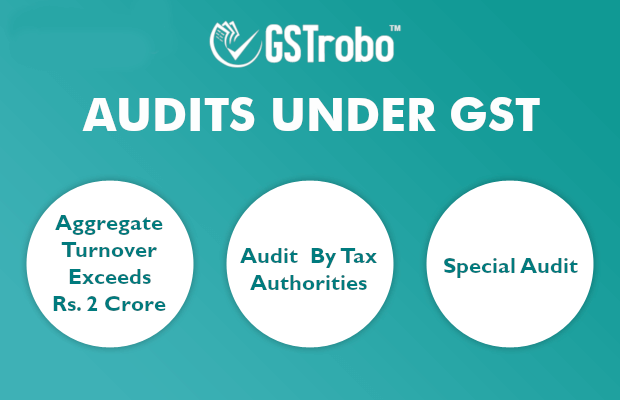All About Audit Under GST – Meaning, Types, Procedure and Applicability!
Goods and Service Tax is an indirect tax levied across the whole country which came into force on 1st July 2017. GST is a self-assessment-based tax and being in its early stages, a large no of businessmen are facing hurdles to keep the compliances in check with the law in force. Audit under GST is a tool to keep these compliances under check and ensure the accuracy of the records maintained and the returns submitted by the taxable person.
In this article, we will discuss the powerful audit mechanism in place under the GST law.

1. Meaning of Audit
Audit, under GST, is defined as a process to verify the correctness of turnover declared, taxes paid, refund claimed, input tax credit availed, and a process to assess compliance with the provisions of the GST Act. An audit is done by examining the records, returns, and other documents maintained by the taxable person (person subject to audit). This process is undertaken by the taxable person himself as well as the tax authorities, depending on the type of audit.
2. Types of Audit
The types of audit conducted under GST can be classified under the following categories:
- Audit by the taxable person
- General Audit by tax authorities
- Special Audit by tax authorities
3. Audits at a Glance
| Basis | Audit by Taxable Person | General Audit by Tax Authorities | Special Audit by Tax Authorities |
| Reason for Conducting | Turnover crosses threshold limit | At the discretion of Commissioner | Direction issued by Assistant Commissioner |
| Responsibility for conducting | Taxable Person | Tax Authorities | Tax Authorities |
| Prescribed Authority for conducting | Chartered Accountant/Cost Accountant | GST Commissioner or any officer authorized by him | Chartered Accountant/Cost Accountant nominated by Commissioner |
| Relevant Provision under the Act | Section 35(5) of the CGST Act | Section 65 of the CGST Act | Section 66 of the CGST Act |
| Time Limit | 31st December of Next Financial Year | 3 months from Commencement (extension: 6 months) | 90 days from commencement (extension: 90 days) |
| Expenses | Borne by Taxable Person | Borne by Tax Authorities | Borne by Tax Authorities |
4. Audit by the taxable person
- The taxable person is required to get an audit of his accounts by a Chartered Accountant or a Cost Accountant if his turnover during the financial year exceeds Rs. 2 Crore.
- The following documents are required to be submitted up to 31st December of the next financial year:
- Audited copy of Annual Accounts
- Annual Return in form GSTR 9
- Certified Reconciliation Statement in form GSTR 9C
- Other documents are prescribed[1].
- Failure to file an annual return shall attract[2] a late fee of Rs. 200 per day during the period of failure, subject to a maximum of 0.25% of the said financial year’s turnover.
- This audit is not required to be conducted by any department of the Central Govt./State Govt./Local Authority whose books are to be audited by Comptroller and Auditor General of India or an auditor appointed for auditing the accounts of local authorities.
5. General Audit by Tax Authorities
- This audit is conducted at the discretion of the commissioner. It can either be conducted by the commissioner or any person authorized by him.
- It shall be completed within 3 months from the date of commencement of the audit. The commissioner may extend this time period by further 6 months for reasons recorded in writing.
- The following process is prescribed for the conduct of this audit:
- The taxable person shall be issued a 15 days notice before the start of the audit.
- The taxable person shall be bound to provide the necessary facility for verification of records and furnish information required by the officer conducting audit.
- Within 30 days of completion of audit, the taxable person shall be informed of the findings of audit along with reasons. He shall also be informed of his rights and obligations.
- In case of any default or non-compliance is found during the proceedings, recovery actions shall be initiated against the taxable person.
6. Special Audit by Tax Authorities
- A special audit is conducted where a direction is issued to the taxable person by any officer not below the rank of Assistant Commissioner, after taking the prior approval of the Commissioner.
- The direction can be issued if the Assistant Commissioner forms an opinion during an investigation that the value is not correctly declared or the Input Tax Credit is not availed within normal limits.
- Where the direction is issued, the audit shall be conducted by a Chartered Accountant or a Cost Accountant nominated by the Commissioner.
- The time limit for completion of the audit is 90 days which can be further extended by 90 days on an application made to him by taxable person/C.A/C.W.A.
- The determination of expenses of examination and audit along with the auditor’s remuneration shall be made by the Commissioner.
- The taxable person shall be given a reasonable opportunity of being heard if any findings of the special audit are to be used against the taxable person in any proceedings under this Act.
- In case of any default or non-compliance of the Act, recovery actions shall be initiated against the taxable person.
7. Latest Updates
- The limit of aggregate turnover for GST Audit has been raised from 2 crore rupees to 5 crore rupees for the financial year 2018-19.
- The due date to file GSTR-9 & GSTR-9C for the FY 2018-19 now stands extended up to 30th September 2020.
